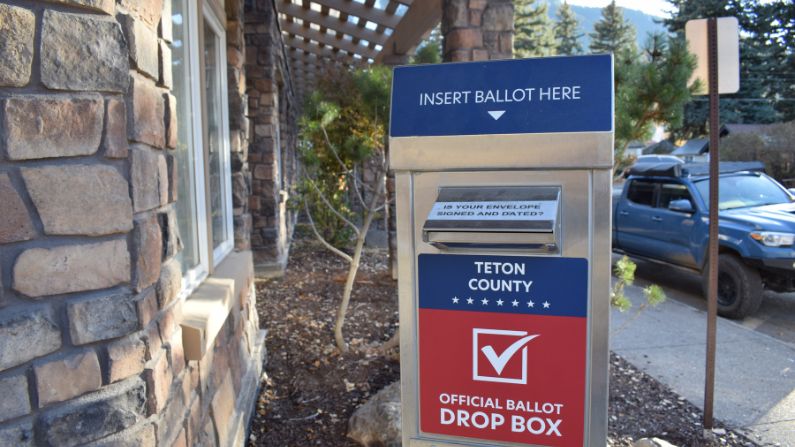It’s officially election season in Teton County. Early voting is already open for the 2022 general election, with Election Day next Tuesday, Nov. 8. One of the most talked-about features of the ballot isn’t tied to a specific politician, though: Teton County voters will find 15 measures on their ballots that could be funded through the Specific Purpose Excise Tax, or SPET.
Jackson Mayor Hailey Morton Levinson talked to us on Zoom about how SPET works and what’s at stake this year. More information is available about the specific measures on the town’s website.
Listen above for more and check out a transcript of the interview below. This conversation has been edited for clarity and brevity.
HANNA MERZBACH/KHOL: Will you start by giving us an overview of how SPET works?
HAILEY MORTON LEVINSON: SPET is one penny of our sales tax. So if you think about our sales tax, we get 6% total on any given item, and one penny is SPET. This tax is for capital projects and for projects that the voters vote on, and that’s what we see on the ballot this November.
KHOL: So, how much would it cost if all these measures are funded?
MORTON LEVINSON: Any voter, when you look at the ballot, you’ll be able to see how much each measure will collect if passed. So, it’s around $160 million. This isn’t a new tax. Whatever passes will just be a continued collection of that sixth cent. And if voters remember or folks look back a few years, the recreation center, which is currently under construction, was a SPET measure that the voters voted on. You vote on it and then it comes to fruition a few years later. It’s twofold because, one, we have to collect the money. And then two, obviously these plans are pretty well laid out, but you need to get the final documents knowing that you do have the funds. And so we can vote for all of these measures, and it won’t raise our taxes from what they are now if every single one of them passes. It’ll just be determined how many years we collect SPET.
KHOL: I know we’re still funding the measures that were passed in the last election cycle. Do you know when we’ll be done funding those measures?
MORTON LEVINSON: Yes. Part of the reason that we’re having a SPET election this cycle is because we predict that those will be done being funded within the next year or so. And so that was part of the discussion among the town and county electeds. We didn’t want to let this lapse. We also knew that there [is] a general election coming up and it’s easier to add items to an already happening election than to hold a special election. That was part of the calculation of why we decided to offer a SPET election this time. So the collection will start in the next year or so, depending on how robust our sales tax collection is.
KHOL: And how do these initiatives end up on the ballot? I know the town put a few of those forward.
MORTON LEVINSON: At the end of the day, the town and county agree on what to put on the ballot. And part of that is state statute. Because we’re the only town in Teton County, we do it together, and we both have to agree to it. And so for this particular election, we started back probably last December and decided, ‘Yes, we’re going to have one.’ That was step one. And then two, the electeds had a discussion of, ‘Okay, we’re going to have one. What sort of projects do we want to see?’ Because this is a government tax. It’s a town and county tax. We asked staff to bring forward capital projects that were important in our plans. And so that’s why you’ll see ones like the sidewalks from the town or employee housing. And then this time around, as well, we had heard interest from different community groups or public groups. And so we did have an application process and we opened it up. It was pretty extensive, and then we vetted it from there. And then we also had a number of discussions on the actual amounts for each measure, so that we could offer a full, well-rounded package of items for voters to consider.
KHOL: The town has two measures on the ballot. As you mentioned, one would focus on sidewalk and pedestrian accessibility and another would fund town employee housing. Would you tell me about these two measures?
MORTON LEVINSON: So, the first one about the sidewalks and pedestrian accessibility, it is a measure that would offer the town the ability to essentially look at our network of sidewalks and how folks move through the town outside of their vehicles and make it easier for them, whether that is actually putting in a sidewalk or having better signage on bike routes. One of the reasons that the town council felt it important to put it on the ballot is that it also provides money to create safe routes to schools. A number of kids have to walk to school or be driven, and they don’t have access to the bus. And that was important for the council to offer those safe routes.
And then the other item is the employee housing for the Town of Jackson. It was important to put employee housing on the ballot because the town, just like any other business in town or any other community member, feels the housing crunch as well and wants to be able to provide housing for our employees. And these are the employees that are providing the most basic services that our community needs. That’s snowplow drivers, police officers, down the line. For me, it’s really important because this is how our town will be able to function.
KHOL: A good number of the SPET initiatives this year are housing projects. It’s the highest number of housing projects that we’ve ever seen on the ballot. What does that tell us?
MORTON LEVINSON: It is definitely the most, and the most money that we’ve seen for housing through SPET. And you can see through the different measures that it’s town, county, school, hospital and community housing. And so the conversation that we’re having community-wide is at the forefront of my mind and was for the electeds when we were deciding what to put on the ballot, because these are the issues. Housing is the issue that is critical to keeping our community here. And again, we see that with the school district housing. They need housing to house teachers. The hospital needs housing to have nurses and doctors. I think it shows that it’s a community wide issue, which to me is obvious, but it’s also all of these different partners working together to make sure housing is at the forefront.
KHOL: There are 15 initiatives on the ballot. That’s the most SPET measures there’s ever been on the ballot. Why is this a method that the town and the county are using more and more to fund these kinds of projects?
MORTON LEVINSON: We’ve used SPET since the mid ’80s, since I was a baby. It really holds government money accountable, which I think is great. It’s transparent. And then it is, what we have found as a community, the best way to fund these really big capital projects that we as a town or county don’t necessarily collect in the other pennies of sales tax. We, in Jackson, put all of our initiatives individually. So you can vote yes on all 15. You can vote on one, you can vote on any combination. Other communities put them as a full bundle. They would put 15 items, and you vote ‘yes’ or ‘no.’ All of them pass or none of them pass. And so I always just think that it’s interesting to see what other communities are doing. Not necessarily to say we should be doing it that way, but just to offer that the way we do it isn’t necessarily the only way to do it.
KHOL: If projects like the town sidewalk and pedestrian accessibility measure don’t pass, is this something the town will still do and fund in a different way? If voters vote against these and they don’t get the majority vote, will these projects still happen?
MORTON LEVINSON: You know, not necessarily because we won’t have the funds to make some of these things happen. That’s why it’s on the SPET ballot to begin with. The housing items, they’re still important enough to make them happen. So if we don’t fund them here and we still want to fund them because we know the importance, it means we have to find the money elsewhere. And so that elsewhere comes from just a smaller pot of money and also competes then against some of the other things that we have to do on a daily basis to make the town run. And so, you know, I would say resources are scarce for the town. If we want to keep functioning as a town, these resources are really important.
KHOL: What else is at stake this election season when it comes to SPET? What are some of those other critical initiatives?
MORTON LEVINSON: I think one of the interesting parts of our conversation as the 10 electeds, so the town and county, was that these 15 different measures really run the gamut of housing to sidewalks to other transportation measures to conservation. And it offers a picture of all the different issues that we as a community are dealing with. For me personally, I will probably vote ‘yes’ on all of these because I really do see how they’re intertwined and know that the success of one could hinge on the other. It really goes back to how interconnected the issues that we work on as a town are. If you think about housing, that trickles down into transportation, because if we’re able to house more of our employees here in town, that means fewer cars are going down the canyon or over the pass. For me, it really is an opportunity to highlight all of the different issues that we have as a community and a way for voters to choose for themselves what’s important to them and to look at it hopefully holistically at our community functions.
Early voting is open in Teton County. Voters can return ballots in-person or by mail leading up to the election, or vote in-person on Election Day, Nov. 8 at these locations.





